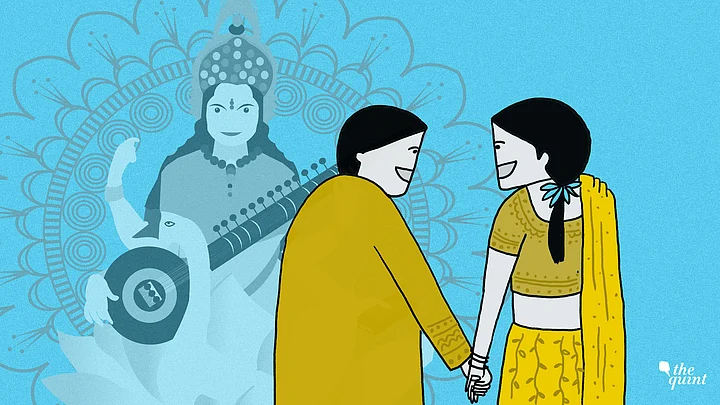Basant Panchami, also celebrated as Saraswati Puja in West Bengal, is a much-awaited day for many young students in the state, who see it as a ‘Valentine’s Day’ of sorts – an opportunity to freely mingle with members of the opposite sex.
But first, they must prove their devotion to the goddess of learning, knowledge and wisdom, and on this day at least, students in Bengal take Ma Saraswati very seriously.
And so, they cast aside all that hinders true learning. Only too joyfully, students place all their text books, note pads, pens, pencils, reference books under the watchful eyes of the goddess; they then legitimately claim a day off from studies, as custom says one mustn’t study on this day.
While Ma Saraswati blesses these tools of learning, the young students set out to do what they can’t usually do (not without reproach) – while away time with friends, or pursue their love interest. Especially for love and its pursuits, there isn’t any day better than Saraswati Puja—most Bengalis would vouch for that. But what made youngsters seek out an alternative to ‘Valentine’s Day’?
Bengal’s ‘Single-Sex School Syndrome’
When it comes to school education for the middle-class and upper middle-class in West Bengal, single-sex schools are the preferred choice. We thought such schools to be the best while growing up in Asansol, West Bengal’s second largest city. Our trips to Kolkata only reinforced this belief, for there too, like in the rest of Bengal, all the so-called ‘elite’ schools (from Don Bosco to La Martiniere to Carmel Convent) were either boys only or girls only schools. This, likely due to a worse colonial hangover than many other states in the country (erstwhile Calcutta was after all the British Empire’s capital until 1911). Many Christian missionaries and Jesuit fraternities had set up single-sex schools in the state.
Such was this bias, that taking a cue from our parents and elders, we actually looked down upon the handful of co-educational schools around us.
“Only those of us who don’t manage to secure admission in good (read single-sex) schools will have to go to the co-eds,” we’d tell each other in the weeks following the Class X board exams, when we were busy figuring out where to pursue higher secondary education. This of course, is a waning (albeit slowly) trend, with many elite co-educational schools coming up in Bengal, especially Kolkata, in the last decade or so.
No Scope for Inter-Mingling of the Sexes
Yet, for all the so-called focus on studies, single-sex schools engendered in us a deep distrust, antagonism even, for the opposite sex. And in many cases, extremely patriarchal – even misogynist views – were fostered in us, as a result of such ‘elite’ education.
As boys, not only did we not have a clue about how girls thought and felt (we imagined them being busy with makeup all through!), we even thought they were inferior and shallow, to study subjects like Home Science.
“We thought similarly about boys,” a friend and fellow journalist who studied in an all-girls school in Kolkata told me the other day. “We saw them as obnoxious show-offs who were way below our standard. In fact, we’d refrain from applauding for boys in joint sports meets, concerts and the likes, lest they felt important about themselves!”
Saraswati Puja Offers a Window of Opportunity
Schools in Bengal, then as much as today, foreclose the possibility of students of opposite sexes coming across each other, forget seeing or knowing them. Private tuitions offer some scope for intermingling, but even there, boys and girls have little chance to interact with each other freely without drawing undesired attention.
Why, countless love stories in Bengal have turned sour with parents finding out about their child’s ‘affair’ from the private tutor!
However, on puja day, all rules around gender-based segregation of spaces are junked. And so, groups of boys go around girls’ schools and hostels checking out their Saraswati pujas, and vice-versa. They hang out together in and around schools and colleges, talking, walking, eating, cracking jokes and taking photographs. The free intermingling draws no social sanction on this one day.
Navigating Romance
The freedom to intermingle is only the first of the pleasures of puja day. For, there’s also puja pandal-hopping, dancing together to popular songs, the occasional dose of bhang and other intoxicants, and partaking of the feast that must include kul (jujube) chutney.
My own childhood was rife with stories of lovers who pined for Saraswati Puja. The lovers would manage to meet for a few minutes or hours every week, but spending an entire day with their beloved? It was near impossible on any day save Saraswati puja, when they could legitimately excuse themselves from studies and home for an entire day or more.
Try as you might, you won’t find Valentine’s Day offering this kind of “social sanction” to youngsters in an otherwise patriarchal, narrow and misogynistic society. Perhaps, it’s only ideal that this happens on the day when we worship the goddess of learning, wisdom and knowledge. After all, part of our learning and growing up also involves getting to know how to respectfully interact with all individuals, including members of other gender(s), and navigate the tricky path of romantic love and respect with maturity.
(The writer is an independent journalist and researcher, and currently teaches at a college in Bengaluru. He can be reached at @b_aritra on Twitter and Instagram. This is an opinion piece and the views expressed are the author’s own. The Quint neither endorses nor is responsible for them.)
(At The Quint, we question everything. Play an active role in shaping our journalism by becoming a member today.)
